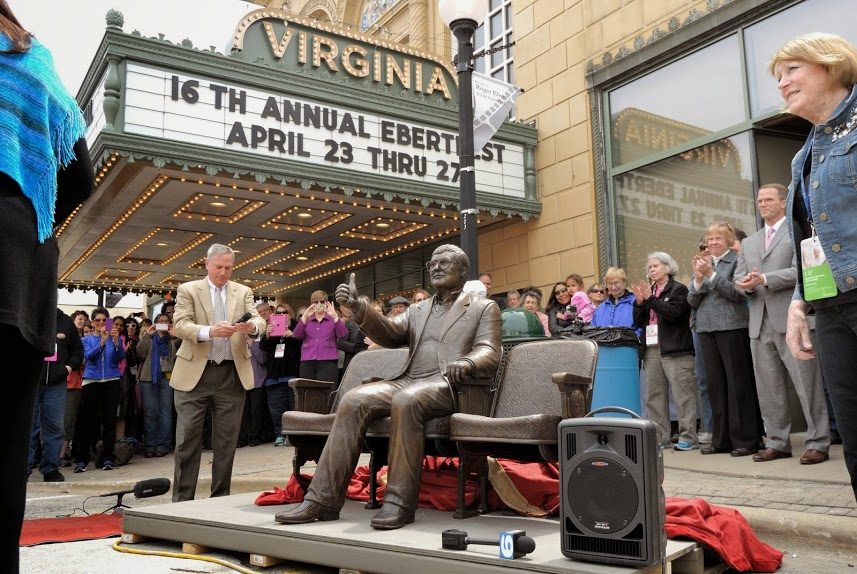What is the purpose of a film festival? The modern definition has changed over the years to reflect the fact that fests like Sundance and Toronto are marketplaces as much as they are celebrations of film. Producers and filmmakers go there to get distribution for their work, which creates a business atmosphere that can distract from an appreciation of the art form. It’s hard to discuss form at after parties or racing from red carpet to world premiere. Roger Ebert’s Film Festival, which just closed its 16th annual incarnation (and is also known as Ebertfest), reclaims the entire concept of the film festival from the businessmen who have arguably skewed its purpose. At Ebertfest, an appreciation of not just film but the way it intertwines with the human condition sits in the front row of every screening. The entire program becomes not just about the specific films but the people who made them, the people who watch them, and the people who write about them. So much of what we do in the world of cinema divides these groups—audience, critics, filmmakers. For four days in Champaign-Urbana, the restrictions of those roles disappear. We are one common thing: film lovers.
This year’s Ebertfest had a particular poignancy given 2013’s passing of its founder and leader. Roger’s shadow loomed large, as it will for years to come, from the opening night screening of Steve James’ “Life Itself” to the unveiling of a statue of the legendary critic to the Q&As that almost always touched on what Roger meant to the world of film. And yet there was a thematic current that struck me repeatedly: this fest was about moving on as much as looking back. We remember Roger but we allow those memories to drive our present instead of forcing us to live in the past. Ebertfest was joyful and forward-looking when it could have just as easily been only somber and reflective.
The program often reflected the ability of the human spirit to overcome and look to the future. James’ film, while emotional, is far from a dirge, producing as much laughter as any that played at the Virginia Theatre this year. In so many ways, James’ films echoes the title of the last piece Roger wrote, “A Leave of Presence.” As filmmakers and fans told stories that were so moving they could have been in a cut of James’ film at “Remembering Roger Ebert,” the mood was emotional but also so filled with the joy of sharing even just a moment with a life so well-lived.
Mortality was an undeniable theme in this year’s films but it was often couched in a way that reflected on the future of those who live on more than those who have passed away. As captured in Oliver Stone’s “Born on the Fourth of July,” Ron Kovic faced unimaginable death head-on in the Vietnam War but turned that pain into a force for good in the form of protest. The impact of death in “Goodbye Solo” forces the title character to forever alter his future. The fading health of a man’s caretaker in the gentle gem “A Simple Life” changes his worldview and appreciation of someone who has been there for him for years, not unlike Roger had been there for so many film lovers. The healing at the center of “Short Term 12,” the friendship that forms in “Museum Hours,” a girl who pushes change through a society that restricts it in “Wadjda”—they were all individual patches in one thematic quilt. Even Spike Lee’s incendiary and still powerful “Do the Right Thing” ends with a neighborhood going about its business after the tragedy of the night before. Like Ebertfest and the film world in general, we remember our role model, pay homage and never forget, but we also move on.
A festival as unique as Ebertfest forces viewers to draw connective thematic threads from film to film but it felt like it went beyond that this year as panels, Q&As, films and even conversations outside the theater reflected not just cinematic appreciation but human connection. The stories told at “Remembering Roger Ebert” of a man who was as generous as he was brilliant carried those who heard them through the films that day. Ebertfest is a reminder that films don’t exist in a vacuum. It’s impossible to watch Bennett Miller’s “Capote” in the way we did before Philip Seymour Hoffman’s passing. Steve James’ film wouldn’t resonate the same if Roger Ebert hadn’t passed away before its completion. Even films like “A Simple Life” and “Museum Hours” strike a different note than they would anywhere else on any other date. Watching them in the context of Ebertfest is something that can never be replicated.
It’s also impossible not to be stunned by the breadth of diversity across only a dozen films. This year’s Ebertfest took audiences from Vienna to Brooklyn to Hong Kong to Massapequa, and featured three films directed by women. Spike Lee shared the same stage with Ramin Bahrani. Ann Hui socialized with Haifaa Al-Mansour. Brie Larson & Keith Stanfield represented the future of acting while Oliver Stone gave us a window into how political cinema has changed in 25 years. Everything at Ebertfest seemed to flow from film to panel to Q&A to film to conversations to panel and so on…
And every one of these guests heard their film open with a short video by Michael Mirasol, in which we heard Roger talk about the civilizing power of cinema. As the saying goes, show don’t tell, and Eberfest this year couldn’t have shown us more of the truth in Roger’s unforgettable words.
Ebertfest Trailer 2014 from Michael Mirasol on Vimeo.












